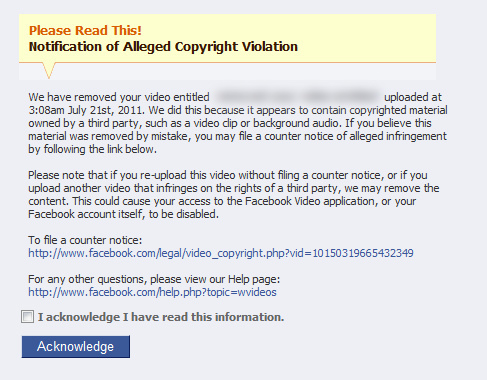
Several members of the
Stop HumaneWatch group on Facebook have contacted us about notices they received, warning that their screen shots or other content have been removed for “copyright infringement”.
Anti-activist terrorism is a common tactic of HumaneWatch members. When they can’t counter the facts, they resort to lies, harassment, and intimidation to protect their alleged right to abuse animals.
But that doesn’t mean you have to sit there and take it.

The screenshot above, taken from HumaneWatch, is one example of content that was falsely reported as copyright infringement. The comment on the screenshot pointed out that HumaneWatch has yet to confront any of the animal abusers and admitted animal killers frequenting its pages.
That didn’t sit too well with the originator of the comment, who didn’t like her hypocrisy being exposed. She filed a false DMCA copyright infringement complaint through Facebook’s automated system in an attempt to suppress our free speech. That was a crime (perjury) as well as a violation of Facebook’s Terms of Service.
According to the copy of the complaint forwarded by Facebook, she complained on the grounds that “A copywrited [sic] photograph that belongs to me is being used by an individual and a group without my permission… The photo in my avatar is copywrited [sic] and belongs to me. I did not give this group permission to use a screen shot of my photo.”
Here are the facts.
HumaneWatchers cannot claim copyright infringement on a comment or a profile picture that they have posted to Facebook, because they expressly gave you permission to repost it. That’s in the Facebook Terms of Service, Section 2.4:
When you publish content or information using the everyone setting, it means that you are allowing everyone, including people off of Facebook, to access and use that information, and to associate it with you (i.e., your name and profile picture).
Got that? If they’ve posted it publicly on Facebook, they have granted you permission to reprint it, to share it anywhere on or off of Facebook, and to associate it with their name and profile picture.
So, what do you do if someone has filed a fraudulent copyright complaint against you?

Your first clue that something is wrong will probably come from the stern warning on Facebook telling you that your content has been removed, and warning you that if you continue to violate Facebook Terms of Service, you could be exiled from Facebook. They’ll require you to mark the checkbox acknowledging that you’ve read the warning.
Being unfairly accused of wrongdoing is infuriating, and a little intimidating. That’s the intent of the harassment.
But keep in mind that (a) you’re innocent, (b) it’s an automated system with no ability to make intelligent judgments, and (c) it ultimately means nothing, since you’re about to clear your name and turn the tables on your harasser.
The warning will contain a link to Facebook’s
DMCA Counter-Notice Form. Click that link.
You’ll be asked to provide your contact information, and this may be provided to the person who filed the complaint. The address required is just a point of contact, so feel free to use a PO Box, maildrop, or other intermediary address if you’re not comfortable releasing that information.
In the box asking why Facebook was wrong to remove the content, you can copy and paste the following:
The content is not an original work of authorship as defined by 17 U.S.C. Sec. 101 et seq., and is not subject to the DMCA. Furthermore, use of the content was expressly permitted by Facebook Terms of Service Sec. 2.4, which reads: “When you publish content or information using the everyone setting, it means that you are allowing everyone, including people off of Facebook, to access and use that information, and to associate it with you (i.e., your name and profile picture).”
In a day or two, Facebook will contact you by email to confirm that you are filing a counterclaim. You may need to repeat that information in your reply, and you may need to remind Facebook of their own Terms of Service. Be patient, be polite.
Once Facebook’s staff has gathered the information they need to determine that the claim was false, they will notify the harasser of your counterclaim, and will restore the content within 14 days. You can also repost the content before that time, since it has been cleared by Facebook and they have agreed to stop blocking it.
Any false claims from the harasser may result in the closure of their account, so be sure to ask Facebook’s staff to pursue disciplinary action against the complainant. If this has happened before, include that information in your report.
Filing false abuse reports is not just a violation of Facebook’s Terms of Service, it’s a crime. Stand up for your rights, and make those HumaneHaters eat their words!
 Several members of the Stop HumaneWatch group on Facebook have contacted us about notices they received, warning that their screen shots or other content have been removed for “copyright infringement”.
Anti-activist terrorism is a common tactic of HumaneWatch members. When they can’t counter the facts, they resort to lies, harassment, and intimidation to protect their alleged right to abuse animals.
But that doesn’t mean you have to sit there and take it.
Several members of the Stop HumaneWatch group on Facebook have contacted us about notices they received, warning that their screen shots or other content have been removed for “copyright infringement”.
Anti-activist terrorism is a common tactic of HumaneWatch members. When they can’t counter the facts, they resort to lies, harassment, and intimidation to protect their alleged right to abuse animals.
But that doesn’t mean you have to sit there and take it.
 The screenshot above, taken from HumaneWatch, is one example of content that was falsely reported as copyright infringement. The comment on the screenshot pointed out that HumaneWatch has yet to confront any of the animal abusers and admitted animal killers frequenting its pages.
That didn’t sit too well with the originator of the comment, who didn’t like her hypocrisy being exposed. She filed a false DMCA copyright infringement complaint through Facebook’s automated system in an attempt to suppress our free speech. That was a crime (perjury) as well as a violation of Facebook’s Terms of Service.
According to the copy of the complaint forwarded by Facebook, she complained on the grounds that “A copywrited [sic] photograph that belongs to me is being used by an individual and a group without my permission… The photo in my avatar is copywrited [sic] and belongs to me. I did not give this group permission to use a screen shot of my photo.”
Here are the facts.
HumaneWatchers cannot claim copyright infringement on a comment or a profile picture that they have posted to Facebook, because they expressly gave you permission to repost it. That’s in the Facebook Terms of Service, Section 2.4:
The screenshot above, taken from HumaneWatch, is one example of content that was falsely reported as copyright infringement. The comment on the screenshot pointed out that HumaneWatch has yet to confront any of the animal abusers and admitted animal killers frequenting its pages.
That didn’t sit too well with the originator of the comment, who didn’t like her hypocrisy being exposed. She filed a false DMCA copyright infringement complaint through Facebook’s automated system in an attempt to suppress our free speech. That was a crime (perjury) as well as a violation of Facebook’s Terms of Service.
According to the copy of the complaint forwarded by Facebook, she complained on the grounds that “A copywrited [sic] photograph that belongs to me is being used by an individual and a group without my permission… The photo in my avatar is copywrited [sic] and belongs to me. I did not give this group permission to use a screen shot of my photo.”
Here are the facts.
HumaneWatchers cannot claim copyright infringement on a comment or a profile picture that they have posted to Facebook, because they expressly gave you permission to repost it. That’s in the Facebook Terms of Service, Section 2.4:
 Your first clue that something is wrong will probably come from the stern warning on Facebook telling you that your content has been removed, and warning you that if you continue to violate Facebook Terms of Service, you could be exiled from Facebook. They’ll require you to mark the checkbox acknowledging that you’ve read the warning.
Being unfairly accused of wrongdoing is infuriating, and a little intimidating. That’s the intent of the harassment.
But keep in mind that (a) you’re innocent, (b) it’s an automated system with no ability to make intelligent judgments, and (c) it ultimately means nothing, since you’re about to clear your name and turn the tables on your harasser.
The warning will contain a link to Facebook’s DMCA Counter-Notice Form. Click that link.
You’ll be asked to provide your contact information, and this may be provided to the person who filed the complaint. The address required is just a point of contact, so feel free to use a PO Box, maildrop, or other intermediary address if you’re not comfortable releasing that information.
In the box asking why Facebook was wrong to remove the content, you can copy and paste the following:
Your first clue that something is wrong will probably come from the stern warning on Facebook telling you that your content has been removed, and warning you that if you continue to violate Facebook Terms of Service, you could be exiled from Facebook. They’ll require you to mark the checkbox acknowledging that you’ve read the warning.
Being unfairly accused of wrongdoing is infuriating, and a little intimidating. That’s the intent of the harassment.
But keep in mind that (a) you’re innocent, (b) it’s an automated system with no ability to make intelligent judgments, and (c) it ultimately means nothing, since you’re about to clear your name and turn the tables on your harasser.
The warning will contain a link to Facebook’s DMCA Counter-Notice Form. Click that link.
You’ll be asked to provide your contact information, and this may be provided to the person who filed the complaint. The address required is just a point of contact, so feel free to use a PO Box, maildrop, or other intermediary address if you’re not comfortable releasing that information.
In the box asking why Facebook was wrong to remove the content, you can copy and paste the following:
